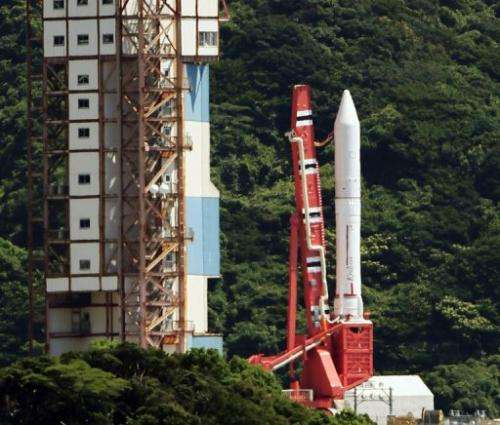Japan suspends satellite rocket launch at last minute (Update)

Japan suspended the launch of its next-generation solid-fuel rocket on Tuesday just seconds before lift-off after engineers discovered a technical glitch.
Japan Aerospace Exploration Agency (JAXA) had planned to launch the Epsilon rocket from the Uchinoura Space Centre in Kagoshima, southwestern Japan, using just two laptop computers in a pared-down command centre.
But the countdown was automatically halted just 19 seconds before blast-off "as an emergency measure due to some abnormal positioning" of the rocket, a JAXA spokeswoman said.
It was not clear if this was a physical problem or a data error, she added.
"We cancelled today's launch and can't say anything about the timing of our next launch, as the cause of the trouble is still unknown," the spokeswoman said.
Ichita Yamamoto, cabinet minister in charge of space technology, urged the agency swiftly to relaunch the rocket, which Japan hopes will become competitive in the global space business.
"The cancellation was very regrettable," Yamamoto told a joint news conference with JAXA executives near the launch pad.
"But this rocket must be launched successfully," he said. "As the minister of space policies, I strongly hope JAXA will pursue the cause and realise the launch."
Parents and children had gathered in public spaces throughout Japan to watch the launch live.
Television news footage showed audiences in theatres emitting sounds of puzzlement in unison when the appointed launch time passed without any lift-off.
The three-stage Epsilon—24 metres (79-feet) long and weighing 91 tonnes—was scheduled to release the telescope "SPRINT-A" at an altitude of 1,000 kilometres (620 miles).
SPRINT-A is the world's first space telescope for remote observation of planets including Venus, Mars and Jupiter from its orbit around Earth, the agency said.
The Epsilon is about half the size of the nation's liquid-fuelled H2-A rocket, and a successor to the solid fuel M-5 rocket that was retired in 2006 due to its high cost.
The small-sized rocket is equipped with artificial intelligence "for the first time in the world" that allows autonomous checks by the rocket itself, JAXA said.
"It also allows us to carry out launching procedures, including ignition, through only two laptop computers," another JAXA spokeswoman said.
At the control centre only eight workers were engaged in the launch operation, compared with some 150 people usually needed when JAXA launches its mainstream H2-A rocket.
The agency has halved the production and launching cost to 3.8 billion yen ($37 million) from that of the previous M-5.
"Catching troubles before the launch means the entire system is still under control," said Tetsuya Hanyu, a researcher at Mitsubishi Research Institute's science and technology group.
"But it may take some time to relaunch it if the trouble is found to be serious enough to require the replacement of major parts, for instance," Hanyu said.
© 2013 AFP


















